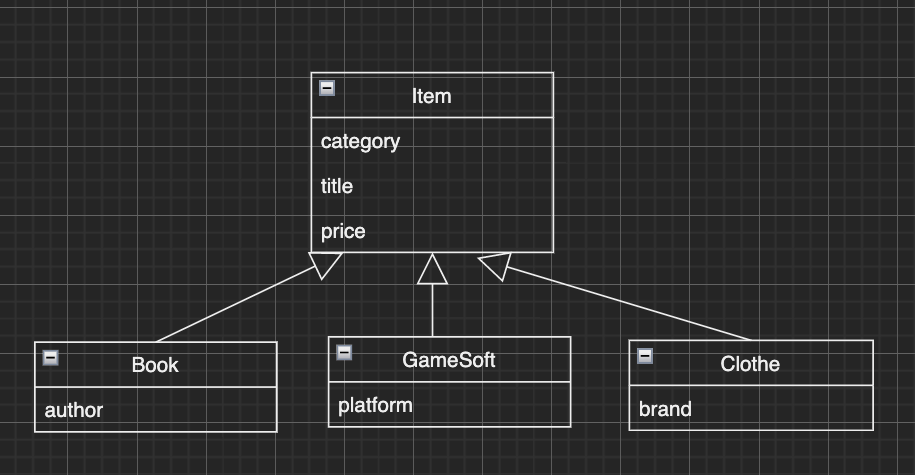こんな人に読んでほしい
- ポリモーフィズムって言葉は聞いたことがある
- ググってもイマイチわからない
- 具体例を出して説明してほしい
具体例
ここはブック○フ。最近は、本も洋服もゲームも売っている。
こことコンビニさえあれば、一生生きていけるなぁ、
そんなことを思っていた矢先、在庫を管理するシステムの設計を任された。
先輩 「まず、在庫の情報を出力するコードをかいてね☆」
さぁ、こんなときどんなコードを書きますか??
ポリモーフィズムを一言でいうと
ポリモーフィズム(多態性)の文字通り、同じメソッド名なのに、
クラスによって実行結果が変わる
今回の例でいうと
Itemを継承しているBook、GameSoft、Clotheにおいて定義したprintメソッドがあり、それを呼び出すと、それぞれの子クラスに合わせて違う結果を返してくれる
情報の整理
- 在庫(stock)にある商品(item)には全て、title, price, categoryがある
- 商品の種類は3種類
- 本(book): 著者(author)の情報がある
- 洋服(clothe): ブランド(brand)の情報がある
- ゲーム(gamesoft): どの機種のゲームか(platform)
という情報がある
継承関係を示す
Book, GameSoft, ClotheはそれぞれItemを継承している

コードをかいていく
まずはポリモーフィズムを使わない例から
クラス
class Item
attr_reader :title, :price, :category
def initialize(category, title, price)
@category = category
@title = title
@price = price
end
end
class Book < Item
attr_reader :author
def initialize(category, title, price, author)
super(category, title, price)
@author = author
end
end
class GameSoft < Item
attr_reader :platform
def initialize(category, title, price, platform)
super(category,title, price)
@platform = platform
end
end
class Clothe < Item
attr_reader :brand
def initialize(category, title, price, brand)
super(category, title, price)
@brand = brand
end
end
データの準備
- 本には昔から好きな小説
- ゲームには人生で初めて1000時間以上プレイしたゲーム
- 洋服はよく行くお店の名前
book_stocks = []
gamesoft_stocks = []
clothe_stocks = []
book_stocks << book = Book.new('ゴールデンスランバー', 980, '伊坂幸太郎')
gamesoft_stocks << gamesoft = GameSoft.new('ドラゴンクエスト8', 4980, 'ps2')
clothe_stocks << clothe = Clothe.new('ネルシャツ', 1980, 'Uniqlo')
データの出力
book_stocks.each do |book_stock|
puts "#{book_stock.author}:#{book_stock.title}:#{book_stock.price}"
# -> 伊坂幸太郎:ゴールデンスランバー:980
end
gamesoft_stocks.each do |gamesoft_stock|
puts "・ゲーム【#{gamesoft_stock.platform}】#{gamesoft_stock.title}:#{gamesoft_stock.price}"
# -> 【ps2】ドラゴンクエスト8:4980
end
clothe_stocks.each do |clothe_stock|
puts "{clothe_stock.brand}-#{clothe_stock.title}:#{clothe_stock.price}"
# -> Uniqlo-ネルシャツ:1980
end
次はポリモーフィズムを使う例
クラス
Itemクラスの内容は同じ
class Book < Item
attr_reader :author
def initialize(category, title, price, author)
super(category, title, price)
@author = author
end
# 以下を追記
def print
puts "#{@author}:#{@title}:#{@price}"
end
end
class GameSoft < Item
attr_reader :platform
def initialize(category, title, price, platform)
super(category,title, price)
@platform = platform
end
# 以下を追記
def print
puts "【#{@platform}】#{@title}:#{@price}"
end
end
class Clothe < Item
attr_reader :brand
def initialize(category, title, price, brand)
super(category, title, price)
@brand = brand
end
# 以下を追記
def print
puts "#{@brand}-#{@title}:#{@price}"
end
end
データの準備
stocks = []
# データを準備
stocks << Book.new('本', 'ゴールデンスランバー', 980, '伊坂幸太郎')
stocks << GameSoft.new('ゲーム', 'ドラゴンクエスト8', 4980, 'ps2')
stocks << Clothe.new('洋服', 'ネルシャツ', 1980, 'Uniqlo')
データの出力
# ポリモーフィズムを使うと圧倒的に綺麗に書ける
stocks.each{|stock| stock.print}
以上で終わります!